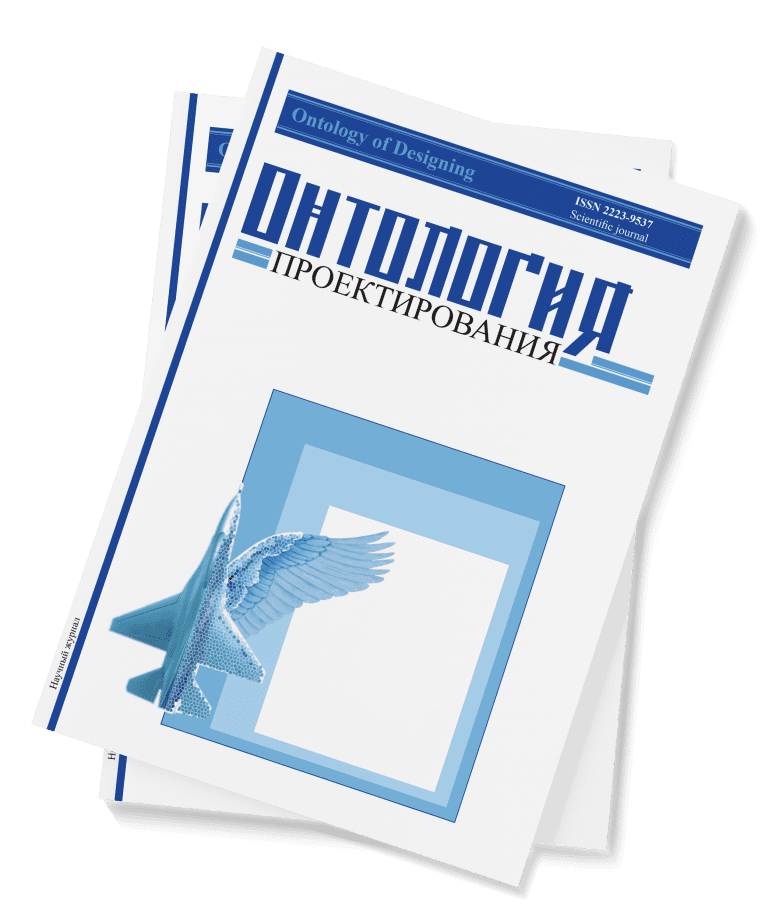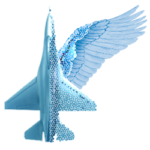
Ontologists and designers of all countries
and subject areas, join us!
Within the scientific discussion to try to get closer to the “Creator’s idea”, to understand and to explain the process of creation, development, self-organisation, modelling and designing of the future through the knowledge of the process of creating artefacts, evolution and selection.
Edit Open Access Policy
This journal provides immediate open access to its content on the principle that making research freely available to the public supports a greater global exchange of knowledge. All issues of the journal are available in the Journal issues section.
Ontologiâ proektirovaniâ (Ontol. proekt.)
ISSN 2223-9537 (Print)
ISSN 2313-1039 (Online)
Impact factor РИНЦ 1.19 (2018), 0,85 (2019), 1,08 (2020), 1,01 (2021), 0.92 (2022), 1,09 (2023)
Journal's objectives
Bring together efforts of Russian and foreign scientists, focusing on actual problems of the methods of designing and offering a place for scientific discussions
Propose approaches, technologies, methods and algorithms for solving practical problems in various fields and areas of designing based on the developing scientific direction
Assist young scholars, postgraduates and undergraduates in the understanding of their responsibility for the development of modern technologies, that ultimately form the future of civilization
From the editorsDisintegration of memory persistence GENERAL ISSUES OF FORMALIZATION IN THE DESIGNING: ONTOLOGICAL ASPECTS
From the editorsThe path to science GENERAL ISSUES OF FORMALIZATION IN THE DESIGNING: ONTOLOGICAL ASPECTS
Research field
Ontology of Designing as a scientific direction within the framework of computer science & engineering includes:
concepts analysis and thesaurus development; analysis of criteria and the models of designed object, methods and design scenarios; gathering and processing the information about the object as a system and its constituent elements.
Designing as a process and domain knowledge about the artefact is the subject of ontological analysis done by researchers and narrow specialists. Ontology of designing, its concepts and basic principles are invariant to the subject area, while design as an activity, is always object-oriented. Ontology of designing as a scientific discipline incorporates and generalises the experience from different domains.
Journal in scientific databases
The journal is included in the list of peer-reviewed scientific publications, in which should be published basic scientific results of dissertations for the degree of Candidate of Sciences, for the degree of Doctor of Science (list of Higher Attestation Commission of the Russian Federation Ministry of Science and Education 01.12.2015) by groups of scientific specialties 05.13.00 and 05.07.00. From 03.26.2019 on scientific specialties 05.13.01, 05.13.17, 05.13.18 and 05.07.02, 05.07.05. From 01.02.2022 – 1.2.2., 2.3.1., 2.5.13., 2.5.15.
15.02.23 added 2.3.4., 2.3.5., 2.3.7., 2.3.8., 2.5.1. and 5.12.4.
Final category of the journal according to the Higher Attestation Commission — K1
The journal is included in the list of journals included in the Russian Science Citation Index (RSCI) database on the Web of Science platform, as well as in the “White List” of scientific journals approved by the Interdepartmental Working Group established by the Ministry of Education and Science of the Russian Federation.
Scientific journal “Ontology of Designing” has entered into an electronic licensing relationship with EBSCO Publishing, the world’s leading aggregator of full text journals, magazines and eBooks. The full text of JOURNAL can be found in the EBSCOhost™ databases. on the scientific electronic library of open access CyberLeninka, and also on the publishing platform Readera.
The journal is hosted in the Natural Sciences Editions collection on the EastView platform.
License
The content of the scientific journal is distributed under a license CC-BY 4.0 (Creative Commons Attribution 4.0 International License) that allows everyone to download, reuse, reprint, modify, distribute, copy publications and create new materials based on them, provided that the authorship and source are indicated.
Plagiarism Detection License
All the manuscripts submitted to the Journal are checked for incorrect borrowings and plagiarism using either the Antiplagiat system (for papers written in Russian) and online sources Google Scholar or Exactus Like (for papers written in English)
Archiving
The journal uses the PKP Preservation Network (PKP PN) to digitally preserve all the published articles. The PKP PN is a part of LOCKSS (Lots of Copies Keep Stuff Safe) program offers decentralized and distributed preservation, seamless perpetual access, and preservation of the authentic original version of the content.
Also, the journal makes full-text archives on the Russian Science Electronic Library (http://elibrary.ru/) platform.
Our partners
Subscription
Publisher has organized a subscription to the journal (see details in section Subscription).
